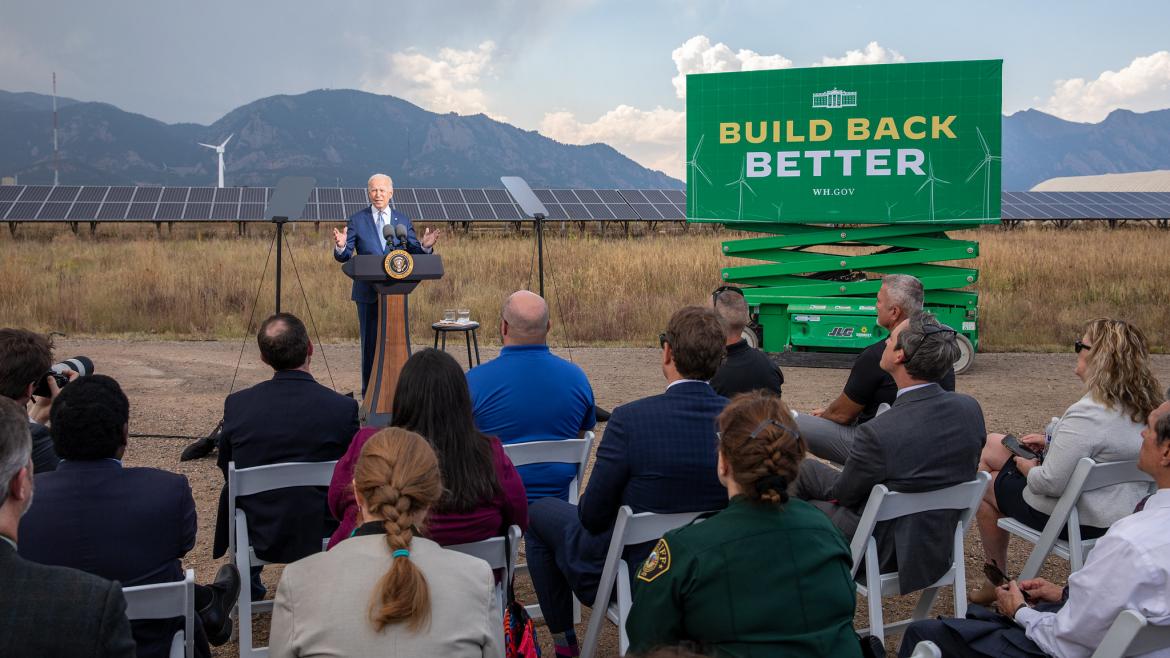Inside the Greenhouse is a monthly newsletter about FCNL’s environmental work, ways to engage members of Congress, and stories that impact our work.
Climate Initiatives in Recovery Package
The current draft of recovery legislation, also called the reconciliation bill, awaits a vote in the House before it can go to the Senate. After deliberation by several House committees, the House Budget Committee released the full text of the bill. The draft includes the following energy and environment provisions:
-
Payments for utilities companies that source electricity from clean energy.
-
Tax incentives for individuals who purchase electric vehicles or bicycles.
- Environmental justice programs at higher education institutions.
- A Clean Energy Performance Program that will pay utility companies that improve their clean energy percentage by 4% each year and charge a fee to utilities that fail to meet that threshold.
- Electric vehicle infrastructure.
- Updating our energy grid to provide more clean energy and be more durable in the face of extreme climate events.
- A fee on methane emissions pollution from oil and gas companies.
Holding the Line on the Clean Electricity Performance Program and Carbon Pricing
The initial draft of the recovery package will be revised and slimmed down before a vote in the full House and Senate. As Congress decides what policies to prioritize, we need to keep up the pressure to ensure the legislation includes bold climate provisions, including the Clean Electricity Performance Program (CEPP).
CEPP will create several incentives for utilities to use renewable sources of power, and a set of incentives for clean energy, clean transportation, energy efficiency, and manufacturing that will accelerate the deployment of renewable energy. This will help clean the air we breathe, while creating jobs in the emerging low carbon economy.
FCNL is actively lobbying—separately and in coordination with environmental groups, faith partners, and private sector businesses—for Congress to include a price on carbon in the reconciliation bill.
In 2021, FCNL constituents have sent 2,712 letters in support of climate recovery.
News and Updates
Line 3 Pipeline Opens, May Violate Anishinaabe Treaty
Construction of the Line 3 pipeline was completed and tar sands oil began flowing through it on Oct. 1. Advocates continue to pursue legal methods to halt this, but options are increasingly limited. This news follows a request from a United Nations committee that the United States respond to allegations that pipeline construction infringes on the rights of the Anishinaabe people. The U.S. has until Oct. 15 to respond.
Report finds Climate Change Disproportionately Impacts Communities of Color
The Environmental Protection Agency released a key report clarifying how climate change is affecting socially vulnerable groups in the United States. The report looked at impacts on communities of color, seniors (65+), those with education less than a high school diploma, and low-income individuals. Of those four groups, people of color are estimated to be most impacted by climate change symptoms such as poor air quality, extreme temperature, and coastal flooding.
Biden Announces Global Methane Pledge
President Joe Biden announced the United States will work with the European Union on a Global Methane pledge, committing to reduce global methane emissions 30% by 2030. This is a positive response to the IPCC’s Sixth Assessment Report that detailed methane emissions reductions as one of the most effective ways to curb global warming and climate change.
A Moment for Mother Nature
The redwood trees at Hoyt Arboretum in Portland, OR, some up to 500 years old, help to remind us of what we are trying to achieve: climate policies that help us to live in greater harmony with Mother Nature so that future generations will be able to enjoy their majesty.


